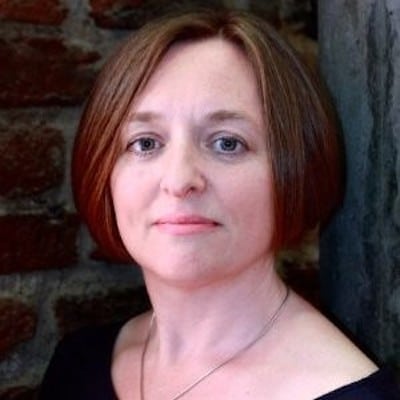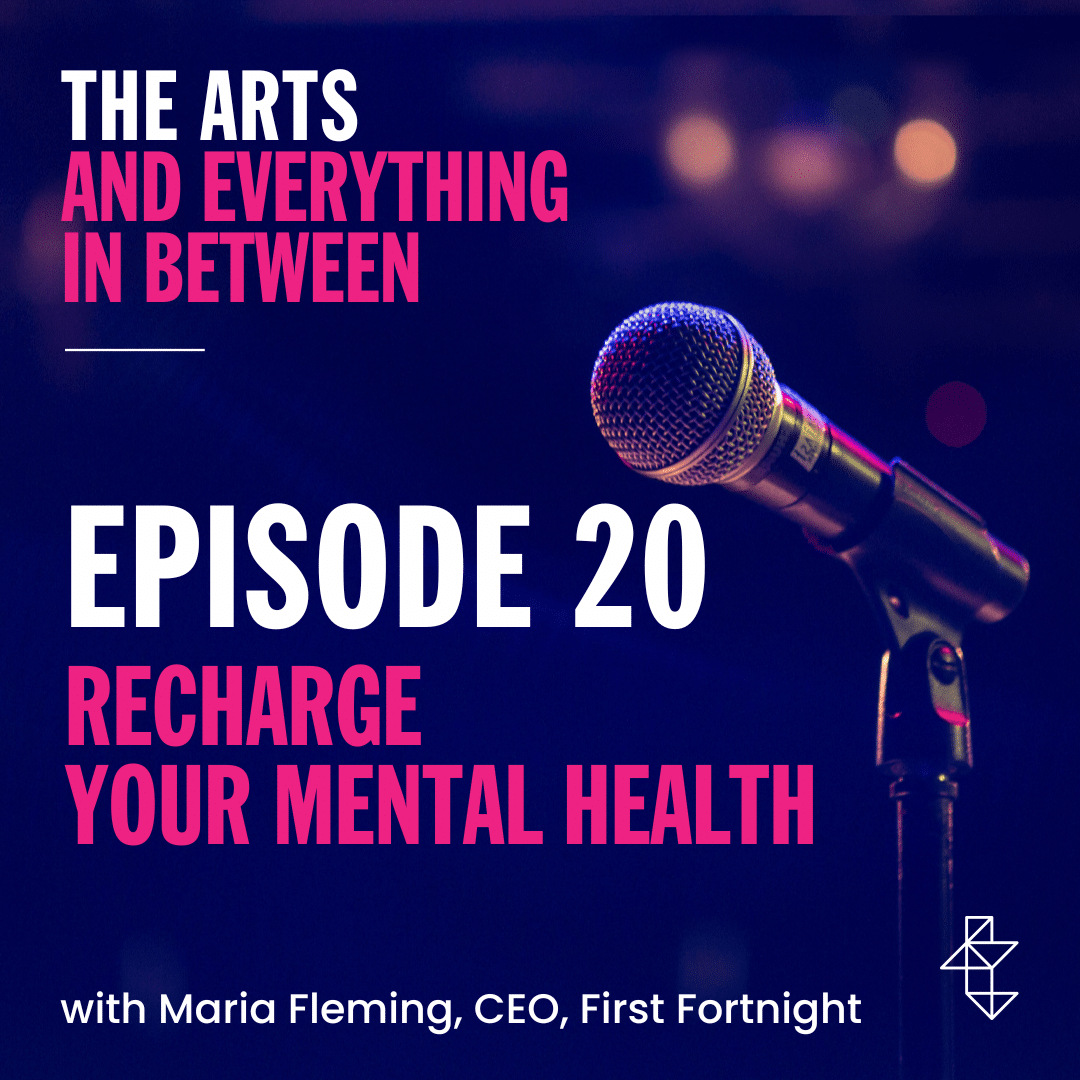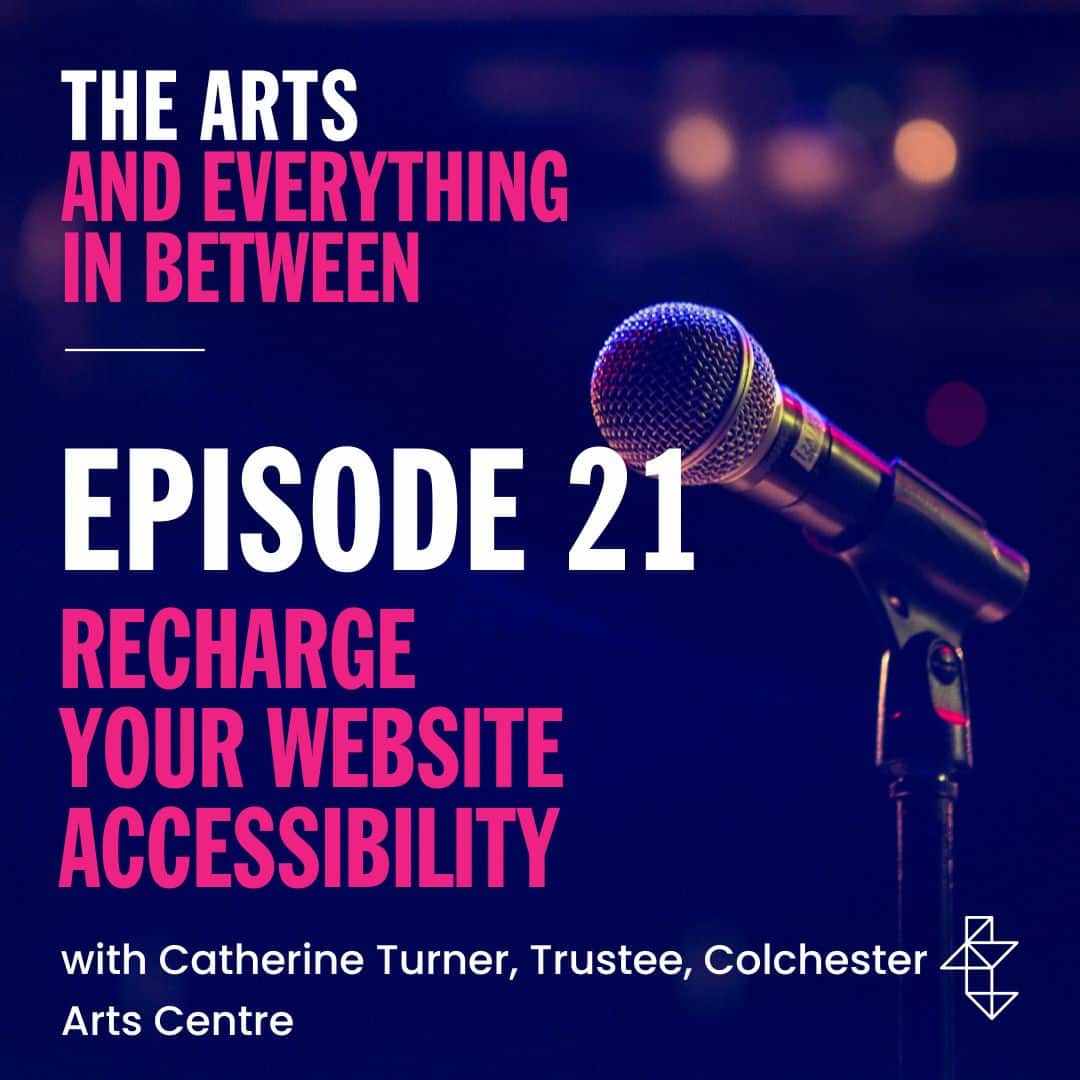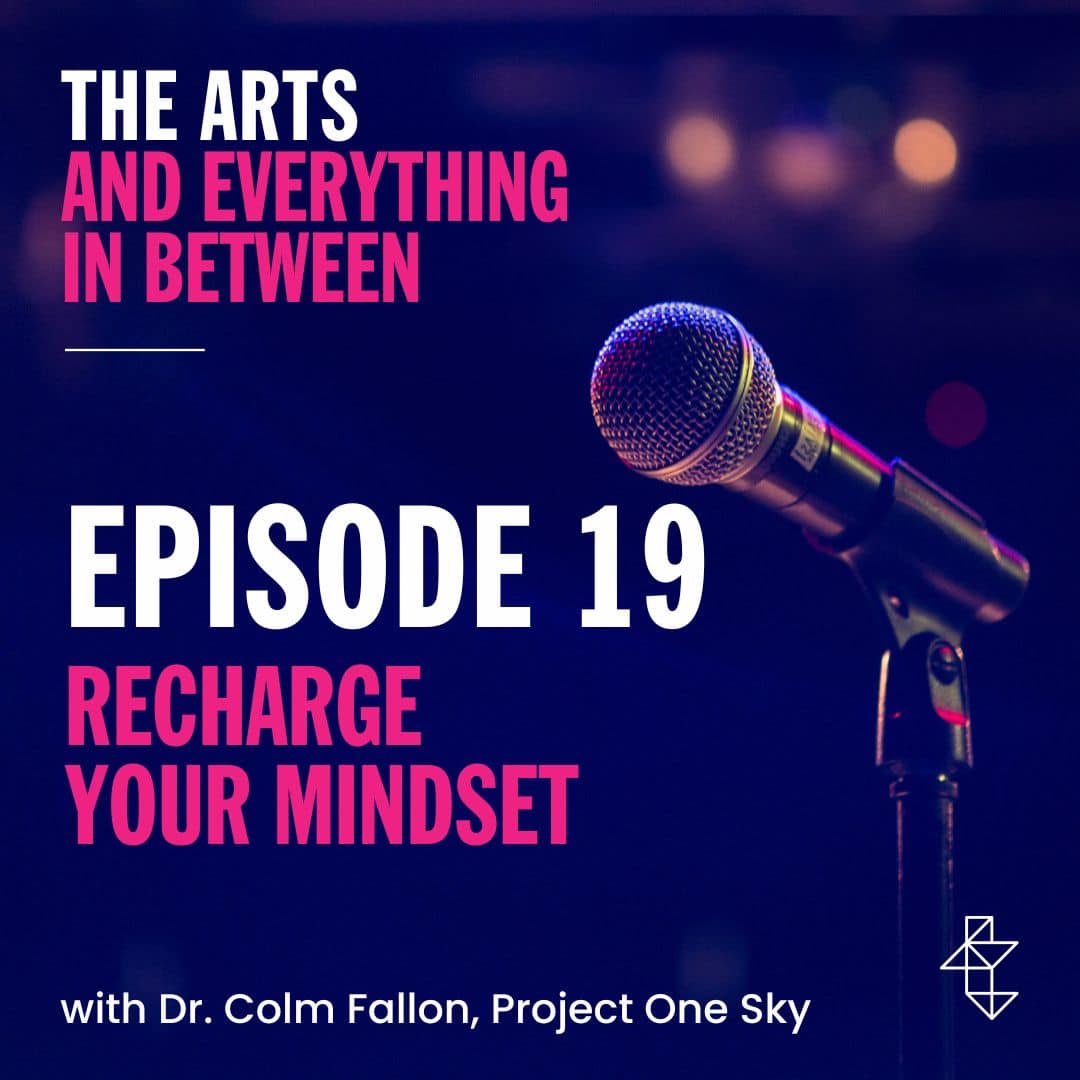Live from RECHARGE! Recharge Your Mental Health with Maria Fleming
With:

Artists have always championed initiatives of great social importance, often becoming beacons for social change. With this idea as their foundation, Irish charity, First Fortnight aims to challenge mental health prejudice through arts and culture.
First Fortnight CEO Maria Fleming, discusses the charity’s annual festival whose aim is to create mental health awareness and end stigma. She delves into how unscripted conversations can help to change people’s perceptions about the ordinary experience of mental health.
Maria also shares how her own experiences have shaped her thinking around mental health and the specific mental health challenges that we all faced during covid.
In this episode, Maria also reminds us how important it is for people working in the arts and culture industry to take care of their own mental health as well; First Fortnight provides free mental health care to the whole of the cultural sector.
Slides below so you can follow along with Maria’s talk.
Recharge Dublin Maria Fleming First Fortnight
—————————————-
THE ARTS AND EVERYTHING IN BETWEEN PODCAST
Investigate new ideas and learn from your arts, culture and heritage peers! Join us every two weeks as we interview arts industry experts and get their take on the biggest issues facing the arts and culture world today. You’ll get ideas to try and practical tips, plus hear from arts and culture managers working in every role from marketing to management – and every area – from theatres and music venues to festivals, museums, heritage sites and more.
—————————————-
GOT A GREAT TOPIC OR STORY TO SHARE?
Got a great topic for the podcast? Want to share your story with the arts and culture world? Get in touch! [email protected]
—————————————-
RESOURCES
A big thank you to Maria Fleming, CEO of First Fortnight.
To learn more, participate or donate visit: https://www.firstfortnight.ie/
—————————————-
GET MORE INSIGHT AND SHARE THE KNOWLEDGE!
Facebook – www.facebook.com/Ticketsolving
Twitter – twitter.com/ticketsolvers
LinkedIn – www.linkedin.com/company/ticketsolve
Instagram – www.instagram.com/ticketsolve/
FOLLOW TICKETSOLVE
About Our Guest

Featured Guest

Maria Fleming
Maria has more than 20 years of experience working in the arts with Ireland’s leading companies and theatre artists, including Dublin Theatre Festival, The Ark and Druid Theatre Company. She is a passionate social justice campaigner and is a volunteer advocacy champion with the Irish Cancer Society and is also the Chair of The National Campaign for the Arts.
Welcome to the arts and everything in between podcast brought to you by Ticketsolve.
Lucy Costelloe: Next up, I would like to give a warm tickets of welcome to Maria Fleming, CEO of First Fortnite. Maria has more than 20 years of experience working in the arts with Ireland’s leading companies and theater artists, including Dublin Theater Festival, the Arc and Druid Theatre Company. She’s a passionate social justice campaigner and is a volunteer advocacy champion and also now recently appointed on the board for the Irish Cancer Society. Please welcome Maria Fleming.
Maria Fleming: Thank you very much and delighted for myself and neve that the microphone is also hobbit sized. They’re there. So. My name is Maria Fleming. I’m the CEO of First Fortnite, which is Ireland’s mental health arts festival. And we aim to address and challenge and hopefully one day end the stigma that’s attached to mental health. And we’re looking to do that through the arts and through cultural action. And the First Fortnite Festival happens the first two weeks in January every year. The clue was in the title. And we are cross disciplinary. We work in film, theater, dance, music, spoken word, and we also have a wide geographical spread. We’re a Dublin based organization, and most of our events are based in Dublin. But we do work with organizations across the country, and we have partnerships with venues, artists, and organizations across the country. We try to work in democratized spaces, so not just in arts venues, but to reach audiences by working in places where audiences might be. So, for example, in 2023, we had Timmy Creed performing Spliced in the Hamball Alley in Crow Park, the home of the GAA. We also had poetry happening in the Royal College of Physicians, and we had yoga, meditation, and swimming on Kalimi Beach. And our artists that we work with, they may have lived experience of mental health or mental ill health, or they may just feel strongly about an issue connected to mental health. And through that way, they would address the issue through their art. And we know that by audience attending art events that address the issue of mental health, that it starts conversations and conversations among people, unscripted conversations, helps to normalize the topic of mental health. And this is the way in which we’re looking to break down the stigma. So what am I doing here at a ticket solve event for box office staff and looking at managing tickets? And that’s a very good question. And again, I would say the clue is in the title. So the title for today’s forum is Recharge. And one of the ways that we can look at recharging is to look after ourselves, our well being, and our mental health. So First Fortnite is working in the area of mental health. We’re addressing the issues around that, but I am very conscious that also all of our staff need to be minded in that process. So in 2023, we completed a full in person full capacity, sold out events for our festival. And it was so great to be back with our audiences and back in the spaces that we wanted to be in. But can I take you back to 2022? When this fella appeared on our television screens and somebody mentioned it earlier, we’ve all managed to forget quite a lot that’s going on, and we forget how recent it was. So in December 2021, getting me dates mixed up now? Yes, December 2021, just ahead of our festival in 2022, the government announced new restrictions. Now, we were prepared for 50% capacity. We were still working in that way, but some of you may remember that at that time, they surprised everyone with an 08:00 P.m. Curfew. So that happened two weeks out from our festival on January 2. Two weeks out on December 20, when most of the artists, venue managers, and that that we would be working with would be about to put on their out of office for Christmas. And we’re scrambling to Pivot to work around with events. We were looking to, as we have all done unproduce events that we had produced. We were postponing events till later in the year. We were canceling some events that just could not happen, and then trying to move some events to 05:00 or 06:00 in the evening to fit the 08:00 curfew. So I spent most of Festival 2022 in my sitting room on Zoom, attending events online. And some of those events were fantastic, but I looked like most of these people a lot at that time, I think because I was unhappy and miserable at having to do the festival online. So the impact that that had, we all know the impact that that had on everyone, and in particular on people managing tickets. You know, the back end of every event has to be restructured again. If you’re changing the date, if you’re changing the time, you have to contact the audience, you have to negotiate with the artists, you have to rework contracts with the venues. And all through this, I was really conscious. We are a mental health arts festival, and I am putting the staff through incredible stress. And sometimes, like, a decision would have to be made if a member of staff stays up all night. We can change everything that we need to do for that event, but that member of staff is getting no sleep. And I tried to, where possible, make the choice where we go with being imperfect, and we don’t deliver everything the way we necessarily want to do, but that member of staff gets a good night’s sleep and they’re better able to cope with the rest of what’s happening in the festival. So then I remember really clearly on the last night of the festival, and this is just in January 2022, we had Peter Gowan performing Chronicles of Ogil in Smock Alley, and the show came down at half seven last night. At the festival, we legged it around the corner to try and get a pint and it was closed. They were doing last orders at half seven because it was an ace clock curfew and they needed everybody out. And we stood on the road, said our goodbyes, each of myself and my colleagues got into different taxis, went home, and I’m home at half eight, a quarter to nine at the end of my festival. And it’s such an anticlimax. And then what happened? So this guy appeared again then a week after our festival and all restrictions were removed, so we had to watch. I was delighted for you all. No, really. So we had to watch the next festivals that follow us. No 50% capacity, no 08:00 curfew, no COVID certs barely masks and hand sanitizers, and things just seemed to return back to normal. It was hard not to be bitter, but just the reason that I wanted to talk about that was that to remind ourselves that that happened. It was a lot, it happened to everybody. It was quite recent. And I think in the charge to come back to the normality that we wanted in the race to deal with the pent up desire that there are from our audiences, are we forgetting to mind ourselves and our staff in that and acknowledging that everybody is somewhere different on the journey of coming back and returning to normal, whatever that may be? One of my colleagues is actually at home with COVID as we speak, so it hasn’t gone away. So just to remember that. So the rest of the year, when we’re not doing the festival, what first Fortnite does is we provide creative art therapy for children, adults and adolescents who are homeless or at risk of experiencing homelessness. And the reason that we provide creative art therapies is that we believe in the power of the arts. So we provide music therapy, art therapy, drama therapy for people who are really struggling, who are in a vulnerable population and dealing with maybe chaotic lives and crises. And the reason why art therapy might work for them, I believe, is because of the power of the arts and creativity and what that can achieve, that maybe talking therapy can’t achieve for people. And whenever I’m speaking to an audience that isn’t the arts sector, you all believe and know in the power of the arts. But when I’m speaking to an audience that aren’t the art sector, I often cite this study. Oh, sorry. That text should be up there, but I can tell you what it says. So the University of London neuroscientists in the University of London did research that discovered that audiences heartbeats synchronize when they attend the theater. So when an audience is sitting in a theater and watching what’s happening on stage, if the action gets tense, heartbeats increase. If it calms down and relaxes, heartbeats slow down. And when they break for the interval and go out into the foyer, the heartbeats all go back to the individual heart rates and they come back in for the second act and the heartbeats synchronize again, which I think is just magic. And it’s something like I say, that we all know of and we’re aware of the power of the arts. But it’s so lovely to have a piece of science that you can quote up people that shows what is powerful about the arts and why we want to be in connection. Sitting in an audience, watching a live event. And the difference that is from being sitting in your own sitting room and watching the television, not to knock that it’s all good as well. But the other thing that I sometimes reference people is an example that I came across when I was working in the arc and we were exploring relaxed performances, our autism friendly performances. And there was a stage manager’s report that had gone viral and it was a performance in the States for young audiences. And as you will be aware, stage managers write up reports at the end of every shows talking about if a lighting queue didn’t work or if somebody missed a line, or if a prop broke or whatever. But this report went viral and the stage manager stated that they said, while we can all agree today’s performance wasn’t our finest, that all paled into significance when we discovered that a young boy in the audience who had autism spoke to his teacher about the play and said if there’s a dragon, there’s going to be fire. And there was a dragon and there was fire. The boy used full sentences and attached addressed his teacher by her name. The boy had never spoken before. The teacher didn’t know that if he could speak or if he knew her name. And when the play finished, the boy retreated back into his silent world. So theater compelled that boy to speak. He was so moved or compelled by what he saw on the stage. Again, I would say magic. So the reason that I’m giving these examples is to say that what we do matters, what we do is important. And we know for ourselves as a sector and for our audiences, we all missed it when it wasn’t there and we missed it when it wasn’t there because it’s important and because it makes a difference in people’s lives. So another reason why I think Lucy might have asked me to speak today is because I experienced something slightly different through the pandemic as well. So in 2019 I was diagnosed with breast cancer and I had my surgery and my chemotherapy pre COVID. And then Leo Vradkar stood up in the States and said the country was closing in March 2020. And the next day I started four weeks of radiotherapy in St. Luke’s Hospital. So when we were being told to quarantine and that it was very important for cancer patients to quarantine. I had to go every day to a hospital for four weeks and it was really scary. It was really frightening. This is a tweet I gave from the waiting room on day one in St Luke’s Hospital. And normally my tweets would get likes from the five usual family members and this like, got 3000 and something likes and comments that kind of blew up. But being frightened, being alone a lot of the time for a long period in hospital waiting rooms, I got to thinking, and we all had time to think across that time. Actually, it was very funny while I was going through this. So, as I say, pre COVID. I had had my surgery and my chemotherapy, and I found a journal that I was keeping. And I had written in December 2019 that I felt like my world was getting very small, that I was spending a lot of time at home, that I was sitting on the couch and I was missing a lot. Who knew that in March 2020 you would all join me? So thank you for that, I appreciate. But as a result of that experience, I changed a lot of things. I changed my job and I started working with First Fortnite, which combined my two passions, the arts and advocacy. I changed what I cared about. I care less about a lot of things now, which is a great thing. I have a lot less folks to give and the things that I care about now are the things that are important to care about. So I just wanted to share some of the learnings that I have that might be of interest to you or resonate with you. And one of the things is to say that we work in an amazing sector. So the love and support and cards and flowers and home baked goods that I got from all our colleagues in the arts sector were just amazing and we should never take that for granted. And I don’t think it’s necessarily the same for other sectors. I don’t think we mind each other in the same way in other sectors. What we do matters. What we do is brilliant and important and we can only do that if we’re our best selves and if we burn out, we can’t deliver what matters for a nonverbal child who’s going to see a production and a play. So mind yourselves and mind each other so that we don’t burn out. Fear is an opportunity. I spent a lot of time terrified and it was good for me and it brought about opportunities. So don’t fear fear. Remember that we’re all on our own journey. This has impacted everybody, but it has impacted everybody differently. The other thing that I learned, like, apart from working in the arts, my hobbies would have been the arts. So my free time was spent going to theater, going to film, going to concerts, all of which were good things. But one thing I found as a result of my cancer diagnosis was this fabulous group of people. So this is a Dragon Boat team, the Puribel Paddlers, and they are all breast cancer survivors. And once a week, I get into a boat and spend an hour with them on the water. And it is the best hour of my week every week. And I think it makes me a better worker and a better person and easier to live with, because I do that. So I wanted to thank you all for the opportunity to talk to you. I hope some of that made sense to some of you and to the box office managers who are in the audience. I know there are a few of you there. I just want to say that I could not do what you do. And what you do is vital and important and makes the magic that we create possible. I don’t know what the back end of a box office system looks like. I don’t want to I should never be let near one. I’m a liability when it comes to it. But I just want to acknowledge you today and thank you for the work that you do. I want to thank tickets all for the invitation, and I want to thank Lucy for pushing me outside my comfort zone. Thank you.
Next Episode
Live from RECHARGE! Website Accessibility with Catherine Turner
Website accessibility is a necessity in an age where the internet plays a crucial role in providing information, services, and opportunities. But what does digital accessibility really mean for the user? What can your arts organisation do to improve accessibility for your audiences?
Previous Episode
Live From RECHARGE! Recharge Your Mindset with Dr. Colm Fallon
How often do you take time for self care? We all know it is important but taking time for yourself is probably last on your (long) to-do list. In this episode, Dr. Colm Fallon discusses the importance of self care for your health.




